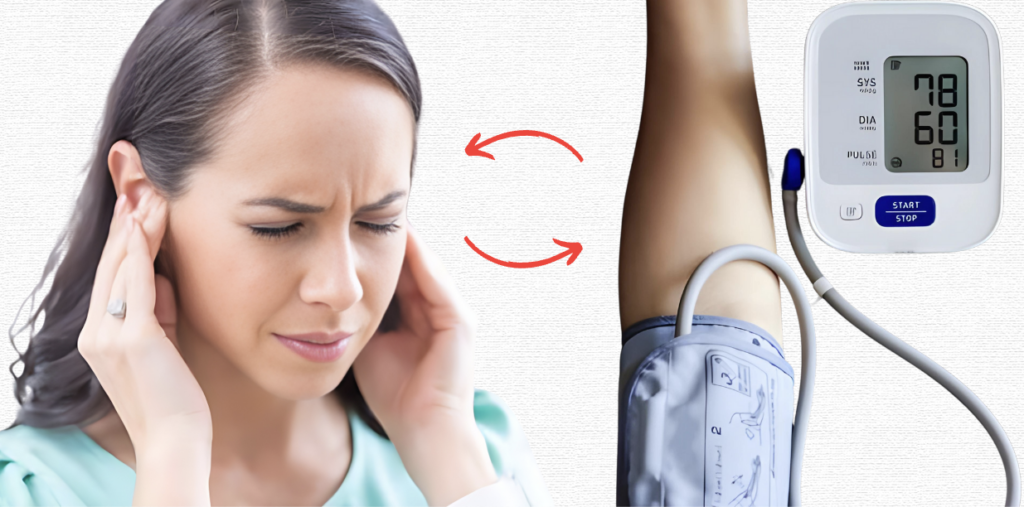Health Conditions
Surprising Link Between Tinnitus and Blood Pressure
Tinnitus, often known as a persistent ringing, buzzing, or humming in the ears, affects millions of people throughout the world and has a significant impact on their quality of life. While the impact on auditory perception is well documented, new research reveals a link between tinnitus and blood pressure levels. This surprising correlation raises important questions about the complex relationship between hearing health and cardiovascular health.
Understanding the association between tinnitus and blood pressure could not only improve our understanding of the ailment but also pave the door for more comprehensive approaches to its treatment. In this article, we will look at the most recent research and discuss the effects of tinnitus on blood pressure, throwing light on a fascinating junction of auditory and cardiovascular health.

Understanding Tinnitus and Blood Pressure
Pathophysiology of Tinnitus
Tinnitus is a condition in which the ear hears ringing, buzzing, or hissing sounds that are not produced by an external sound source. The illness affects millions of people worldwide and can be caused by a variety of reasons, including loud noise exposure, ear infections, and age-related hearing loss.
Tinnitus’ pathophysiology is not fully understood, although it is assumed to be caused by damage to the cochlea’s hair cells, which transmit sound impulses to the brain. A variety of factors can contribute to this injury, including loud noise exposure, some medicines, and aging.
Blood Pressure Basics
Blood pressure is the force exerted by blood against the walls of the arteries as it flows through the body. It is measured in millimeters of mercury (mmHg) and denoted by two numbers: systolic blood pressure (the upper number) and diastolic blood pressure.
High blood pressure, or hypertension, is a common condition that increases the risk of heart disease, stroke, and other health problems. It is defined as a systolic blood pressure of 130 mmHg or higher and/or a diastolic blood pressure of 80 mmHg or higher.
Tinnitus and Blood Pressure
There is some evidence associating tinnitus with high blood pressure. A comprehensive study showed evidence for a relationship between tinnitus and arterial hypertension, but more research is needed.
Studies that looked at the presence of arterial hypertension in patients with tinnitus found a stronger link between tinnitus and high blood pressure than studies that looked at the presence of tinnitus in patients with hypertension. Tinnitus has been associated with reduced cochlear blood flow as a result of medication-induced blood pressure lowering.
Blood vessel abnormalities are infrequent causes of tinnitus, however they are usually linked to pulsatile tinnitus. This type of tinnitus appears to be in tune with the heartbeat, indicating a vascular condition.
To summarize, while the relationship between these two health issues are not fully understood, people with tinnitus should monitor their blood pressure levels and seek medical attention if they observe any changes or symptoms.

Factors Influencing Tinnitus and Blood Pressure
Tinnitus, sometimes known as ringing in the ears, is a widespread illness affecting millions of individuals throughout the world. While it is not a dangerous medical disease, it can significantly affect a person’s quality of life. In this section, we will look at several lifestyle and medical factors that can affect tinnitus and blood pressure levels.
Lifestyle and Environmental Factors
Several lifestyle and environmental variables can lead to the development of these health conditions. These factors include:
Loud noise exposure, whether at work or during leisure activities, can damage the inner ear’s hair cells, resulting in hearing loss and tinnitus. Additionally, exposure to loud noise might raise blood pressure levels.
Stress: Chronic stress can have a negative influence on both physical and mental health. It can also cause high blood pressure and worsen tinnitus symptoms.
Alcohol and caffeine: Both can raise blood pressure and exacerbate tinnitus symptoms.
Smoking can damage blood vessels and raise the risk of high blood pressure. It may also aggravate tinnitus symptoms.
Obesity is a risk factor for high blood pressure, which can worsen tinnitus symptoms.
Medical Conditions and Medications
These health conditions can be influenced by a variety of medical problems and drugs. This includes:
Diabetes is a risk factor for high blood pressure and nerve injury, which can result in tinnitus.
Hypertension can damage the blood vessels in the inner ear, resulting in tinnitus. Additionally, several hypertension drugs, such as diuretics and calcium channel blockers, can cause tinnitus.
High cholesterol levels can contribute to atherosclerosis, which reduces blood flow to the inner ear and causes tinnitus.
Ototoxicity: Certain treatments, such as antibiotics and chemotherapy drugs, can harm the hair cells of the inner ear, resulting in hearing loss and tinnitus.
Hypertension medications: Some hypertension medications, such as beta-blockers, can exacerbate tinnitus symptoms in some people.
To summarize, these health conditions are two frequent disorders that can significantly affect a person’s quality of life. Several lifestyle and medical factors can influence the development of these disorders, thus it is critical to identify and manage them to reduce their impact.

Clinical Implications and Management
Diagnosis and Treatment Strategies
Patients with tinnitus should be checked for comorbidities such as cardiovascular disease and systemic arterial hypertension. A detailed medical history is required to identify risk factors for hypertension, such as age, obesity, and family history. Regular blood pressure monitoring is recommended, and individuals with hypertension should be treated in accordance with current guidelines to limit the risk of cardiovascular problems.
Exercise has been demonstrated to improve blood pressure levels and may be recommended as part of a therapy plan for patients with hypertension and tinnitus. Hearing aids may also be prescribed to improve hearing and lessen the severity of tinnitus, lowering stress levels and improving blood pressure control.
Patients who experience dizziness or other balance issues should be referred to an audiologist or another specialist for further examination and treatment. Tinnitus retraining therapy may be advised for patients who experience persistent tinnitus that causes severe distress and interferes with everyday activities.
Prevention and Long-Term Care
Patients with tinnitus should be taught on the necessity of hearing protection and encouraged to avoid loud noise whenever possible. To lessen the risk of cardiovascular problems, long-term care should include continuous blood pressure monitoring and comorbidity treatment.
Overall, tinnitus can significantly affect blood pressure levels, and individuals with tinnitus should be screened for comorbidities such as systemic arterial hypertension. To lower the risk of cardiovascular problems, treatment techniques may include exercise, hearing aids, and tinnitus retraining therapy, with long-term care focusing on ongoing blood pressure monitoring and comorbidity control.
Conclusion
Finally, investigating the effect of tinnitus on blood pressure levels indicates a complex relationship between auditory perception and cardiovascular health. While more research is needed to understand the mechanisms underlying this association, the findings presented highlight the necessity of holistic healthcare methods that take into account the interdependence of bodily systems.
Addressing tinnitus as both a sensory issue and a possible sign of cardiovascular risk may result in more effective preventative and therapy techniques. By encouraging interdisciplinary teamwork and holistic patient care, we may work to improve the well-being of people suffering from both tinnitus and hypertension, thereby increasing their entire quality of life.
Trusted Health, Wellness, and Medical advice for your well-being


